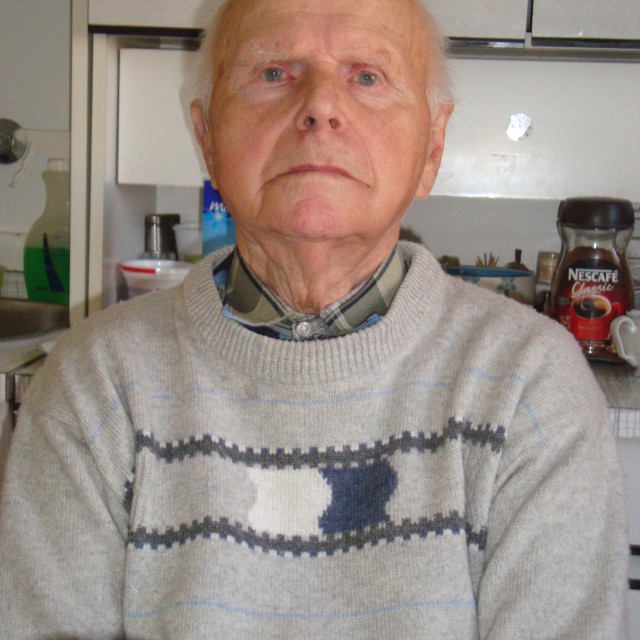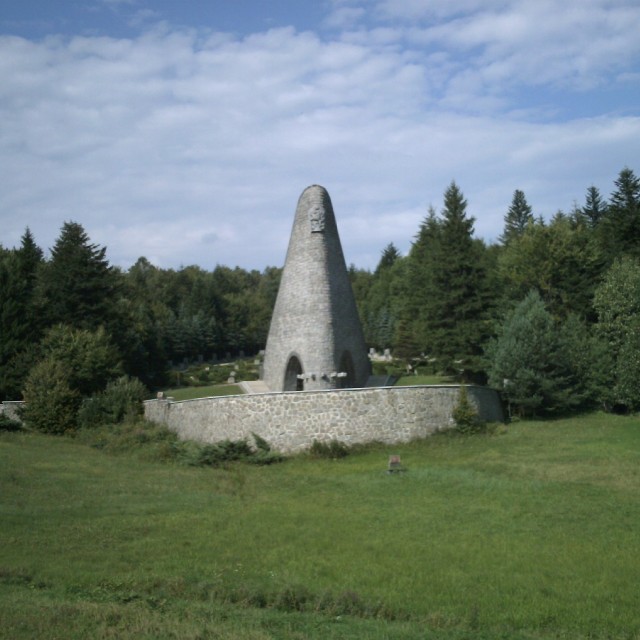I Was Unable to Scream
Among the soldiers participating in the fights of the Carpathian-Dukla operation was also a Volhynian Czech, sapper Josef Holec. After a number of bloody battles the soldiers had gone through, they were all excited to cross the borders of the former Czechoslovakia. “Our reconnaissance unit crossed the border on October 6 and we all followed them later that day. We reached the first Slovakian village. There was a large mine field, so our guys had to clear that area. Then, they redeployed us to Vyšný Komárnik.” On November 17, 1944 a mine exploded right next to Holec. “A shrapnel got stuck in my head and the entire left side of my body was left paralyzed, including my tongue, everything. I could not say anything, I was unable to scream; everything somehow stopped. The guys stretchered me to a barn in Vyšný Komárnik which was the first aid station. A receiving nurse, also a member of the army, gave me an injection, probably against tetanus and she bandaged my wounds. Since I was not talking, she assumed that I was deafened and told my friends: ‘This one is finished too.’ But I heard it…” Josef Holec was transported together with other wounded soldiers back to Poland. “I was in the car with several other soldiers; they were all crying, moaning or screaming and I was silent. The chief surgeon, staff captain Škvařil, got out of the car and started to examine the wounded. I was completely oblivious, but he chose me to be the first one to go. They took to me to the operating room, a barber shaved my head and they started to operate.”
Hodnocení
Abyste mohli hodnotit musíte se přihlásit!
Trasy
Příběh není součastí žádné trasy.
Komentáře

Josef Holec
Josef Holec, a retired Colonel, was born on November 29, 1918, in the village of Český Straklov in Volhynia. After elementary school, he worked on the farm of his parents but the beginning of the war changed his life. He was drafted into the Polish army in the spring of 1939. However, he wasn't mobilized on September 1, 1939, but instead he was transferred to the Soviet army after the fourth partitioning of Poland in 1940. After the German attack on the Soviet Union, he faced the German armies as an artilleryman. He fought for a couple of months near the cities Záporoží and Kirovohrad before he eventually ended up in German captivity. Because he became a prisoner of war, he was allowed to serve in the field kitchen of the Wehrmacht. He became a cook. Ultimately, he was imprisoned in Kiev and then released. In Kiev, he met a Czech "Volksdeutsche", who had been drafted to the Wehrmacht and who obtained a leave permit for him, even though this entailed great risks for him. With that pass, Josef Holec was able to return home to his family. In the years 1941-1944, he was the leader of a local resistance movement called "Blaník", that was a resistance group composed of Volhynian Czechs. After the re-entry of Soviet troops into Volhynia, he volunteered for the newly formed 1st Czechoslovak army corps. He became a sapper. In this formation, he witnessed the battle at Krosno and he survived the Machnówka massacre. However, he wasn't quite as lucky in the great battle for the Dukla pass, where he was hit in the head by shrapnel. That happened on November 17, 1944. He was paralyzed, couldn't speak and lost a lot of blood. The receiving nurse in the field hospital considered him a hopeless case and said: ‘this one is finished, too'. Luckily, the paralysis wasn't permanent and he recovered in a Soviet hospital. After he recovered, he joined the army again in Liptovský Hrádek on February 9, 1945. He was named the commander of the 3rd sapper battalion and remained in this rank until the end of the war. After the war, he settled in the village Tvršice in the Žatecký region. He then joined an anti-Communist resistance group. However, they were all arrested on November 18, 1950, and Josef Holec was sentenced to 18 months in prison. His new home became the Jáchymov prison. After he was released from prison in 1950, he worked as a delivery man, a wage officer and an accountant. He presently lives in Žatec.






